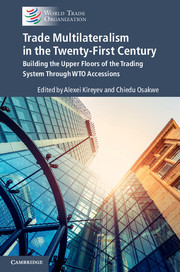 Trade Multilateralism in the Twenty-First Century
Trade Multilateralism in the Twenty-First Century from PART I - WTO Accessions and the New Trade Multilateralism
Published online by Cambridge University Press: 28 November 2017
Abstract
The negotiations on the accession of Kazakhstan to the World Trade Organization (WTO), concluded in 2015, were unique in the history of the General Agreement on Tariffs and Trade (GATT) and the WTO. This uniqueness was reflected in: (i) the complexity of the accession due to its technical substance and geopolitical aspects; (ii) the significant expansion of market access achieved in the process, which is unusual in multilateral negotiations; (iii) the resultant update of the rules in line with GATT Article XXIV related to customs unions and free trade areas; and (iv) the unprecedented involvement and dedication of Kazakhstan's officials, guided by President Nazarbayev, of WTO members and the WTO Secretariat, and personally of WTO Director-General Roberto Azevêdo. The negotiations were essentially a moving target, as they took place at the same time as the Customs Union between Belarus, Kazakhstan and the Russian Federation was evolving into the Eurasian Economic Union (EAEU). The critical elements of the accession were Kazakhstan's commitments on technical barriers to trade (TBT), sanitary and phytosanitary measures (SPS) and on market access for goods – essentially, the behind-the-border issues. Notwithstanding the complexities and the bilateral and regional mechanics of the negotiations, the Kazakh case demonstrates that the WTO accession process has had practical utility even in a geopolitically challenging and technically complex environment. Accessions continue to contribute to the strategic objective of a universal membership by updating trade rules, encouraging market access expansion and strengthening the rule of law. The accession of Kazakhstan thus confirms the WTO's relevance in an ever more complex global economic and trade policy environment.
Kazakhstan became the 162nd member of the WTO on 30 November 2015, bringing to a close twenty years of the toughest, most complex accession negotiations in the history of the General Agreement on Tariffs and Trade (GATT) and the WTO. The challenges that were overcome in the course of Kazakhstan's accession – technical complexity and geopolitical dilemmas – have helped advance multilateral rule-making with substantive systemic contributions. Key areas of advancement stemming from this accession include the principles and design of the tariff adjustment and compensation formula, associated regulatory adjustments and the relationship between a customs union and the multilateral trading system. As a result of these developments, many trade rules were re-confirmed, tightened and clarified.
To save this book to your Kindle, first ensure [email protected] is added to your Approved Personal Document E-mail List under your Personal Document Settings on the Manage Your Content and Devices page of your Amazon account. Then enter the ‘name’ part of your Kindle email address below. Find out more about saving to your Kindle.
Note you can select to save to either the @free.kindle.com or @kindle.com variations. ‘@free.kindle.com’ emails are free but can only be saved to your device when it is connected to wi-fi. ‘@kindle.com’ emails can be delivered even when you are not connected to wi-fi, but note that service fees apply.
Find out more about the Kindle Personal Document Service.
To save content items to your account, please confirm that you agree to abide by our usage policies. If this is the first time you use this feature, you will be asked to authorise Cambridge Core to connect with your account. Find out more about saving content to Dropbox.
To save content items to your account, please confirm that you agree to abide by our usage policies. If this is the first time you use this feature, you will be asked to authorise Cambridge Core to connect with your account. Find out more about saving content to Google Drive.